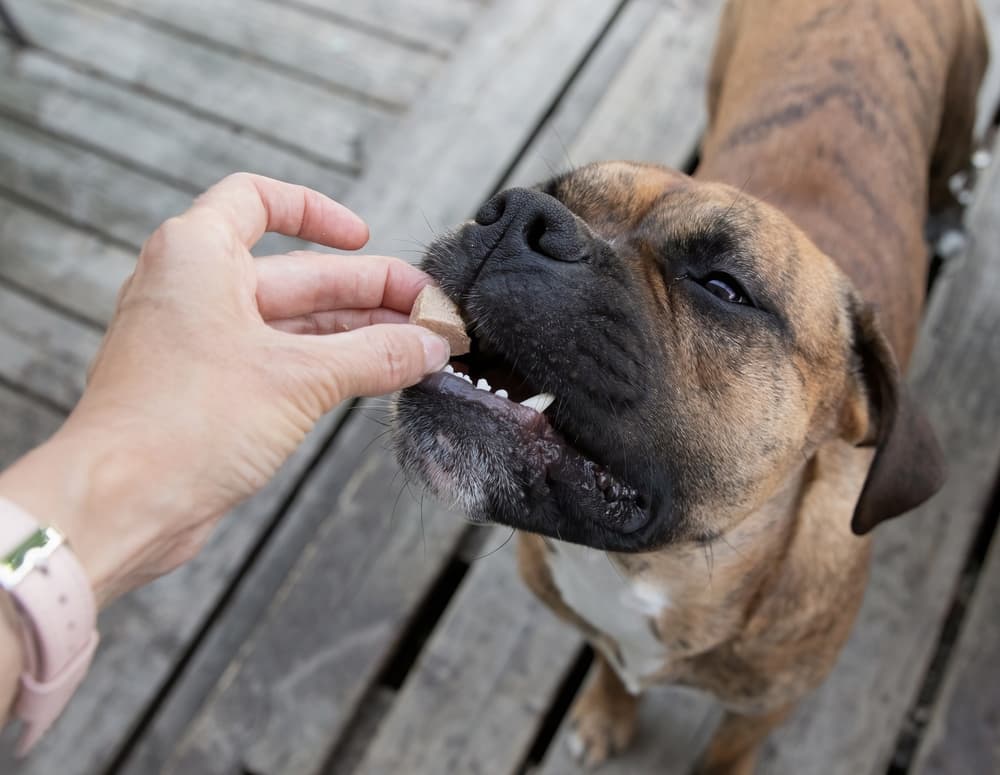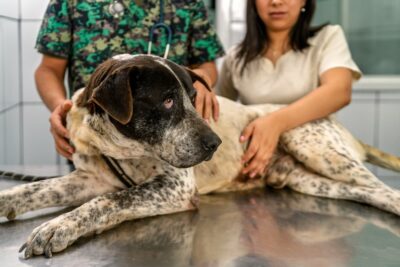Roundworms in Dogs

Overview
There was a time not too long ago when most dogs had roundworms. But now that dogs are given monthly heartworm prevention, they also get monthly dewormer in the same convenient treatment. For dogs who do not receive prevention, infection with roundworms is all too likely. Roundworms are easily transmissible, easy to treat, but harder to get rid of because they persist in the environment.
Here is everything you need to know about roundworm in dogs.
What Is Roundworm in Dogs?

Roundworms are a type of intestinal parasite that infect not only dogs and cats but most other mammals – even including humans. Adult roundworms live in the intestines of animals and steal nutrients. In most adult dogs, roundworm infections are rarely severe enough to cause symptoms. However, where there are roundworms there may also be other intestinal parasites, such as hookworms and whipworms, which all come from a contaminated environment and infect dogs by the fecal-oral route. Yep, bits of poop with infective eggs make their way into a dog’s mouth to cause infection. Gross.
How Do Dogs Get Roundworms?

Adult dogs get roundworm infections through a contaminated environment. Roundworm eggs are shed in feces of infected animals and can survive in the environment for many weeks to months. Once in the environment, roundworm eggs larvate. This is the infective stage. Dogs may come in contact with larvated roundworms in soil contaminated with feces, contaminated animal carcasses, or by ingesting animal tissue which itself is infected. Dogs get larvated eggs on their feet, fur, or nose and then ingest the egg when cleaning themselves.
Puppies can be infected with roundworms during gestation, through the placenta. This can happen even if the mother is not actively shedding roundworm eggs. Roundworms have a complex life cycle that can result in dormant infections that reactivate during pregnancy. This means many puppies are born already infected with roundworms.
Can Humans Get Roundworms From Dogs?
Humans CAN get roundworms from dogs and other animals. Children are the most likely to become infected due to poor hygiene habits. The route of transmission is the same: coming in contact with a contaminated source and then ingesting a larvated egg.
Roundworm Symptoms in Dogs
Many adult dogs with roundworm infections show no symptoms at all. If the infection is severe enough or left untreated, roundworms can cause:
- Diarrhea
- Vomiting
- Weight loss
- Malnutrition
- Poor hair coat
- Decreased energy
- Pot-bellied appearance
Puppies are more likely to show symptoms of roundworm infection, including poor growth or failure to gain weight. Roundworms can cause severe disease, including intestinal obstruction or telescoping of the intestines (intussusception), which are more common in puppies and are fatal if left untreated.
Diagnosing Roundworms in Dogs

Roundworms are diagnosed through microscopic examination of a fecal sample. The fecal sample is mixed into a special solution and centrifuged (the components of the mixture are mechanically separated). The eggs will float to the top of the liquid while the rest of the fecal material sinks to the bottom of the tube. The eggs can then be examined under a microscope. Roundworm eggs have a very specific shape and appearance to differentiate them from other types of parasite eggs.
A centrifugation test is typically done at your veterinary clinic while you wait. A laboratory test that detects the presence of roundworm DNA (PCR test) can also be used. Results of a PCR test may take several days, as the sample has to be sent to a reference laboratory.
Can You See Roundworms in Dog Poop?
Occasionally, dogs will defecate adult roundworms. Adult roundworms are visible when they come up in feces (or vomit), but it is rare to see them. They look like long white strands of cooked spaghetti. More commonly, there are microscopic roundworm eggs in the feces of infected dogs. Rarely dogs will vomit roundworms, but this occurs more frequently in puppies than adult dogs. This happens because of the migration of the adult roundworm into the intestinal tract from the lungs as part of its normal life cycle.
Roundworm Treatment for Dogs

Fortunately, it is very easy to treat roundworms in dogs. There are several oral medications to treat roundworms that your veterinarian can prescribe, including pyrantel pamoate, fenbendazole, moxidectin, and milbemycin oxime. Pyrantel pamoate, alone or in combination with other medications, is available over the counter at pet supply stores. Your pet’s monthly heartworm prevention also contains one or more of these medications to eliminate and prevent roundworm infections.
Due to the life cycle of roundworms and the way the treatment works, multiple doses at certain intervals are required to completely rid a dog of a roundworm infection.
It is possible you will see dead worms in your dog’s feces after treatment is given — this is not concerning.
Since roundworms come from a contaminated environment, cleaning your home and yard is an important part of treatment. Feces should be picked up and thrown away immediately to prevent the eggs from becoming infectious. All of your dog’s bedding and toys should be washed regularly. The eggs require a moist environment, so carpeting and furniture should not be sources of transmission.
General Cost to Treat a Roundworm Infection
Most of the cost for treatment of roundworm infection in dogs is the veterinarian’s exam and fecal parasite test. The medication itself is inexpensive. Costs for veterinary exams differ based on local costs of living but are generally in the range of $50-$150. Fecal tests are similarly in the $20-$100 range. A single dose of roundworm treatment or heartworm prevention is in the $10-$40 range. If the dog requires treatment for other symptoms or illnesses caused by the roundworm infection, those treatments would be additional.
How to Prevent Roundworms in Dogs

Roundworm infection can be prevented by providing your pet year-round parasite control. Unless your dog never goes outside and never comes in contact with another animal, there is no way to fully prevent exposure.
In your own yard, it is helpful to practice good hygiene. Fecal material should be cleaned up and thrown away at least weekly, before roundworm eggs have a chance to become infective. Prevent your dog from preying on wildlife that may carry parasites by keeping him leashed or in fenced areas. Be a good neighbor and always pick up and discard your dog’s feces on walks and at the dog park. Roundworms can infect people, especially children, so your habits affect your whole community.
Related Conditions
- Hookworms
- Tapeworms
- Whipworms









